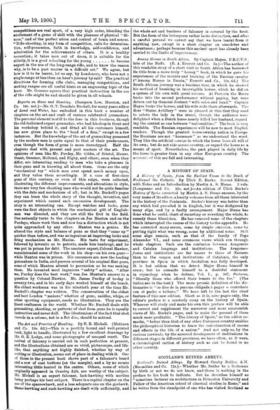A HISTORY OF SPAIN.
A History of Spain, from the Earliest Times to the Death of Ferdinand the Catholic. By Ulick R. Burke. Second Edition, with Notes and an Introduction by Martin A. S. Hume. 2 vols. (Longmans and Co. 16s. net.)—An edition of Ulick Burke's History of Spain corrected by Martin A. S. Hume ensures, by the very name of its editor, a hearty welcome from all those interested in the history of the Peninsula. Burke's history was better than any which had preceded it in English, but it was disfigured by many slips, and by a faulty arrangement. Major Hume has done what he could, short of recasting or rewriting the whole, to remedy these blemishes. He has removed some of the chapters which interrupted the course of the history to the appendix. He has corrected many errors, some by simple omission, some by putting right what was wrong, some by additional notes. Still some slips remain, such as that of the family of Pope Alexander VI., and some erroneous views which run through whole chapters. Such are the confusion between Aragonese and Catalan language and institutions. The Aragonese fueros and institutions are far nearer to those of Navarre than to the usages and institutions of Catalonia, the only province in Spain in which feudalism was fully developed. It is but seldom that we detect Major Hume himself in error; but he commits himself to a doubtful statement in etymology when he defines, Vol. I., p. 367, Pecheros, "literally those who offered their breasts to the foe." (The italics are in the text.) The more prosaic definition of the dic- tionaries is "se dice de in persona obligada pager o contribuir con el pecho o tributo." We have left to the last the chief feature of this new edition. Short as it is, nine pages only, the editor's preface is a masterly essay on the history of Spain. Whoever will study and make his own this preface will be able to correct and supplement the narrower and more amateurish views of Mr. Burke's pages, and to make the perusal of them much more profitable. "The history of Spain," as the editor re- marks, "better than that of any other European country enables the philosophical historian to trace the concatenation of causes and effects in the life of a nation." And not only so, by the curious survivals, by the arrested development of institutions in different stages in different provinces, we have often, as it were, a chronological section of history such as can be found in no other country.






































 Previous page
Previous page